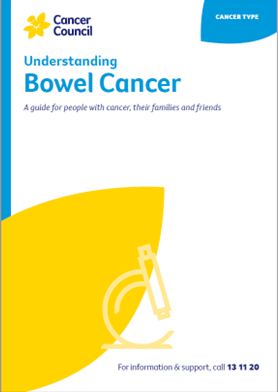- Home
- Bowel cancer
- Managing side effects
- Having a stoma
- Living with a stoma
Living with a stoma
Having a stoma, even temporarily, is a big change and takes some getting used to. Thousands of Australians have a stoma and most lead a relatively normal life. The stoma may sometimes affect your lifestyle, but most issues can be managed, especially with some planning.
Learn more about:
- How a stoma might look
- How a stoma might affect your sex life
- How a stoma might affect what you can eat
- Stoma prolapse
- Support for people with stomas
How a stoma might look
You may worry about the bag being seen under clothing. Although the bag may seem obvious to you, most people won’t notice the bag unless you tell them. The stoma’s location may make some clothes less comfortable (e.g. tight waistbands, belts), but you will generally be able to keep wearing your normal clothes. You might consider buying underwear designed for people with a stoma.
How a stoma might affect your sex life
You may worry that the stoma will affect your ability to give or receive sexual pleasure. Getting used to looking after the stoma will help you feel more confident. Sexual activity for people with a stoma may need a little more planning, but can still be satisfying and fulfilling.
For more on this see Sexuality, intimacy and cancer.
How a stoma might affect what you can eat
Sometimes foods can build up and cause blockages. This means solids, fluids and gas can’t move through as they normally would. To help the stoma settle and to avoid blockages, you may need to change what you eat. Over time, most people find they can eat a normal healthy diet. A stoma blockage can be uncomfortable and cause a bloated feeling or nausea. If you experience symptoms of a blockage for more than 2 hours or you start vomiting, contact your nurse or hospital.
Stoma prolapse
This is when some of the bowel comes out through the stoma opening. Sometimes the prolapse will slide back in by itself, but it may pop in and out. Your stomal therapy nurse or surgeon can tell you how to look after the prolapsed stoma and adapt the stoma bag.
Support for people with a stoma
See a stomal therapy nurse
If there is a chance you could need a stoma, the surgeon will usually refer you to a stomal therapy nurse before surgery. Stomal therapy nurses are registered nurses with special training in stoma care. They are available at most major hospitals, district nursing agencies and in private practice. A stomal therapy nurse can talk to you about the best position for the stoma, answer questions about your surgery and recovery, and give you information about adjusting to life with a stoma. To find a nurse, visit the Australian Association of Stomal Therapy Nurses.
Join a stoma association
With your consent, the stomal therapy nurse will sign you up to a stoma (or ostomy) association. For a small annual membership fee, you will be able to obtain free stoma appliances and products. Stoma associations also provide assistance and information and coordinate support groups. Visit the Australian Council of Stoma Association for more information.
Register for the Stoma Appliance Scheme
The Australian Government’s Stoma Appliance Scheme (SAS) provides free stoma supplies to people with a temporary or permanent stoma. To apply for the SAS, you must hold a Medicare card and belong to a stoma association.
Find a support group
There are many support groups or forums on social media you can follow or join.
→ READ MORE: Managing bowel and dietary changes
Podcast for people affected by cancer
Listen now
More resources
A/Prof David A Clark, Senior Colorectal Surgeon, Royal Brisbane and Women’s Hospital, QLD, The University of Queensland and The University of Sydney; Yvette Adams, Consumer; Dr Cameron Bell, Gastroenterologist, Royal North Shore Hospital, NSW; Katie Benton, Advanced Dietitian Cancer Care, Sunshine Coast University Hospital and Queensland Health, QLD; John Clements, Consumer; Dr Fiona Day, Medical Oncologist, Calvary Mater Newcastle, NSW; Alana Fitzgibbon, Clinical Nurse Consultant, GastroIntestinal Cancers, Cancer Services, Royal Hobart Hospital, TAS; Prof Alexander Heriot, Consultant Colorectal Surgeon, Director Cancer Surgery, Peter MacCallum Cancer Centre, and Director, Lower GI Tumour Stream, Victorian Comprehensive Cancer Centre, VIC; Caitriona Nienaber, 13 11 20 Consultant, Cancer Council WA; Dr Kirsten van Gysen, Radiation Oncologist, Nepean Cancer Care Centre, NSW.
View the Cancer Council NSW editorial policy.
View all publications or call 13 11 20 for free printed copies.

